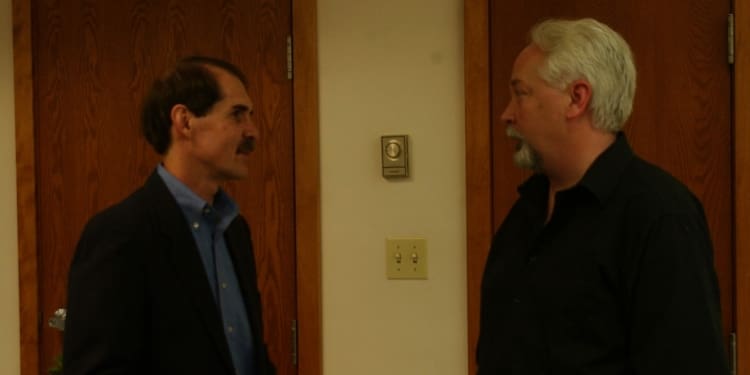Due to recent concerns about drug possession and use within Bethlehem High School, Phil Mullett’s recent presentation on teen substance abuse to the community may have taken on extra significance. Mullett, a certified mental health counselor, planned to discuss non-drug items that teens are using to simulate getting high during a presentation Tuesday, Nov. 29, at the Delmar Presbyterian Church. While Mullett detailed peculiar trends such as teens sniffing nutmeg and pouring vodka into their eyes, there wasn’t a discussion had among the 25 parents and community members in attendance that didn’t relate to recent developments at the high school. During the week of the Thanksgiving holiday, five teens were arrested at Bethlehem High School for charges relating to possession of methadone and marijuana. Three teens were also rushed to the hospital after apparent overdoses. One parent posed a concise question to Mullett during the hour-long presentation.
“Where would you see the next step for us as a community given the recent events of the past week?” she said. Mullett, who most recently worked with kids in Pittsfield, Mass., stressed the importance of the entire community getting involved. “I think it would be helpful to set up some counseling outside of school hours at another location, maybe working with churches or other agencies in the community,” said Mullett, who added that it is important for kids to talk about what happened. Mixed in with conversations of the increased use of synthetic marijuana, sold under names like K2 or Spice, parents and community members expressed concerns about what they’ve seen in the community. “There are numerous teenagers in the middle of the day, during school time, that are at the end of the road smoking, drinking, and some of them are just congregating and not necessarily doing something illegal,” said one Delmar resident who lives near the high school. Others spoke of “pill parties,” where teens bring prescription or over-the-counter drugs and share them with classmates. Along with new trends, teens are also depending on more familiar sources to get high, such as paint fumes, airplane glue and gasoline fumes. Mullett said that high-profile incidents like the ones at Bethlehem High School stir up emotions in a community. “That’s very much a typical response,” said Mullett. “When there’s a crisis situation, people tend to think, ‘Oh my, it happens here.’ The reality is that there are kids suffering from substance abuse, whether it is legal substances or illegal substances.” Rev. Robert Foltz-Morrison said that teenagers will hang out on the church’s property at times and said that he will sometimes engage them to see what they are talking about and what they’ve heard. That was part of the inspiration for the forum. “We need to talk to each other,” said Foltz-Morrison. “We don’t necessarily have the budget always available to do this, but if we have the will to talk to each other, I think that’s important that we all be engaged about the concerns we have for our community and how we can all help each other.” Many in the audience expressed how difficult it is to get everyone – the district, police, residents and students – on the same page and working together. Mullett urged the audience to keep in touch with the district and to request that community issues be addressed. “I think the biggest thing as parents that you can do is push the schools and say, ‘Hey, can we open the schools and have a discussion about the substances?” said Mullett. “Because, if my son or daughter or grandchild or neighbor or somebody’s kid is struggling, they can’t be the only one. Talk about it. Bring the issues out.” Mullett warned the audience that in many communities, it is easier to find marijuana in a school than it is to find a cigarette. He told those in attendance that because of the economy, many teens are turning to cheaper alternatives to simulate the sensation of being high, such as sniffing nutmeg or pepper.
Concerned parents hear of new drug trends
Leave Comment



